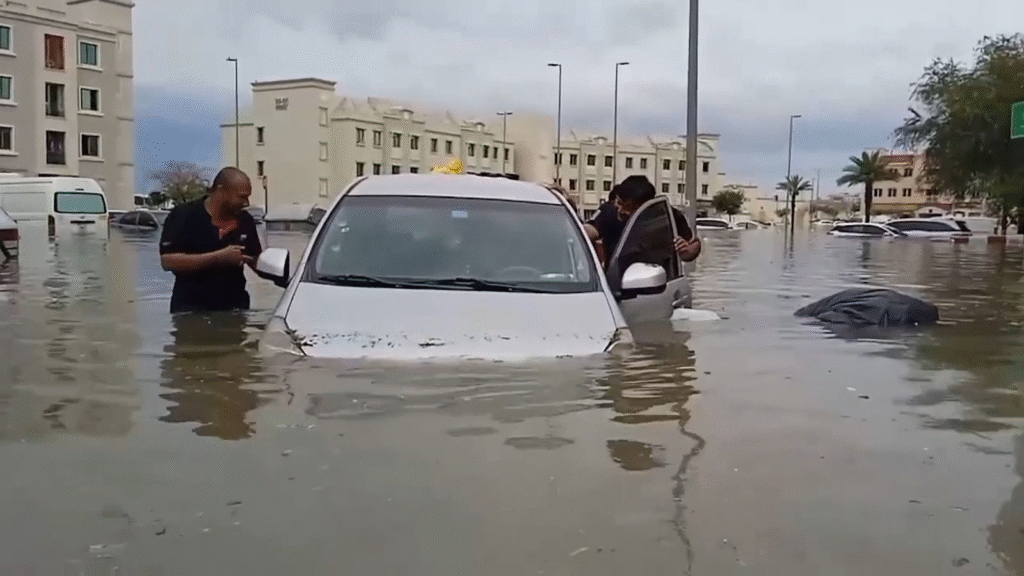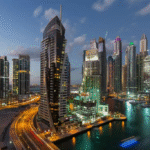Now Reading: Unbelievable Dubai Floods: Residents Shocked as Roads Become Rivers 2025
-
01
Unbelievable Dubai Floods: Residents Shocked as Roads Become Rivers 2025
Unbelievable Dubai Floods: Residents Shocked as Roads Become Rivers 2025

Table of Contents
Dubai, UAE – The futuristic city of Dubai, known for its sparkling skyscrapers and desert climate, was left reeling this week as heavy rains caused severe flooding, bringing the city to a near standstill. In what meteorologists have called an “unprecedented weather event,” rainfall far above average levels pounded the emirate, turning roads into rivers, stranding commuters, and damaging property on a massive scale.
Unusual Rainfall Breaks Records

The National Center of Meteorology reported that Dubai recorded over 150 millimeters of rain in just 24 hours — a figure that dwarfs the average annual rainfall of around 100 millimeters. The heavy downpour overwhelmed the city’s drainage systems, designed to handle much smaller volumes of water.
“This is one of the most intense rain events we have seen in decades,” said Dr. Ahmed Al Saadi, a climate expert at UAE University. “Climate change could be playing a role, making extreme weather more frequent.”
Chaos on the Roads
As the rain fell relentlessly, roads quickly became impassable. Images and videos shared on social media showed luxury cars submerged in water, buses stranded, and people wading through waist-high floods. Dubai’s usually smooth-flowing Sheikh Zayed Road turned into a congested nightmare, with stalled vehicles blocking lanes for hours.
Police and emergency services worked tirelessly to rescue people stuck in their cars or flooded homes. Helicopters were seen assisting emergency crews in reaching people in more severely affected areas.
Public transportation was also hit hard. Several Dubai Metro stations suffered water leaks and had to temporarily shut down services, adding to commuter woes. Authorities urged people to stay home unless absolutely necessary.
Schools, Businesses, and Flights Disrupted
The Dubai government announced the temporary closure of schools, shifting lessons online until conditions improve. Many offices also allowed staff to work from home as it became impossible for employees to commute safely.
At Dubai International Airport, one of the world’s busiest, flight operations faced major disruptions. Runway flooding caused delays and diversions, with passengers reporting long waits and confusion. Airport authorities deployed pumps to clear the water as quickly as possible, but operations remained delayed for hours.
Residents Share Their Shock
For many residents, the flooding came as a complete shock. Dubai is usually associated with heat, not heavy rain.
“I have lived here for ten years and never seen anything like this,” said Sarah Khan, a teacher living in Jumeirah. “Our ground floor was flooded within minutes. We lost furniture, electronics, everything.”
Others voiced concerns about the city’s ability to handle more climate extremes in the future. “If this is the new normal, we need to seriously rethink our infrastructure,” said Tariq Al Hammadi, a Dubai businessman.
Government Response and Recovery Efforts
In response to the flooding, Dubai’s municipal authorities launched a large-scale cleanup and recovery effort. Teams of workers with water pumps and heavy machinery have been deployed to clear the streets and reopen blocked drainage channels.
The government has also announced compensation programs for residents whose homes were severely damaged. Insurance companies are bracing for a huge number of claims from affected homeowners and car owners.
“Dubai is resilient,” said a spokesperson for the Dubai Municipality. “We have dealt with sandstorms and heatwaves before, and we will recover from this as well.”
The Climate Factor
Experts believe climate change may be increasing the intensity and unpredictability of rainfall across the Gulf region. Warmer air holds more moisture, which can then release as torrential downpours.
“Desert cities like Dubai are not designed for these kinds of rain events,” explained Dr. Al Saadi. “It is crucial to upgrade drainage systems and build more green infrastructure to help absorb excess water.”
Dubai has already invested in smart drainage and water management technologies, but this week’s flooding shows there is still a lot of work to do.
Calls for Future Preparedness
Residents and environmental experts alike are calling on the Dubai government to take stronger action to adapt to a changing climate.
“There should be better urban planning, more green spaces to soak up rain, and improved early-warning systems,” said sustainability researcher Laila Al Naboodah.
At the same time, residents are encouraged to invest in flood insurance, prepare emergency kits, and stay informed about weather alerts, as heavy rain events may become more frequent.
Social Media Unites the City

Despite the challenges, the flooding brought out a spirit of solidarity among Dubai residents. Volunteers helped rescue stranded drivers, deliver food to affected neighborhoods, and support families who lost their belongings.
Social media was full of positive stories of neighbors helping each other, from sheltering strangers to distributing drinking water.
“We always come together in times of crisis,” said resident Abdul Rahman, who assisted in moving elderly neighbors from their flooded apartments. “That is the true Dubai spirit.”
Looking Ahead
As skies clear and floodwaters recede, Dubai now faces the hard work of rebuilding and restoring confidence in its infrastructure.
Authorities have promised a full review of the flood response and pledged to invest in making the city more resilient to extreme weather.
While Dubai is used to conquering challenges, this week’s disaster is a wake-up call about the power of nature and the urgency of preparing for a changing climate.
Read More:- Deyaar’s Latest Announcement Shakes Up the UAE Property Market





















